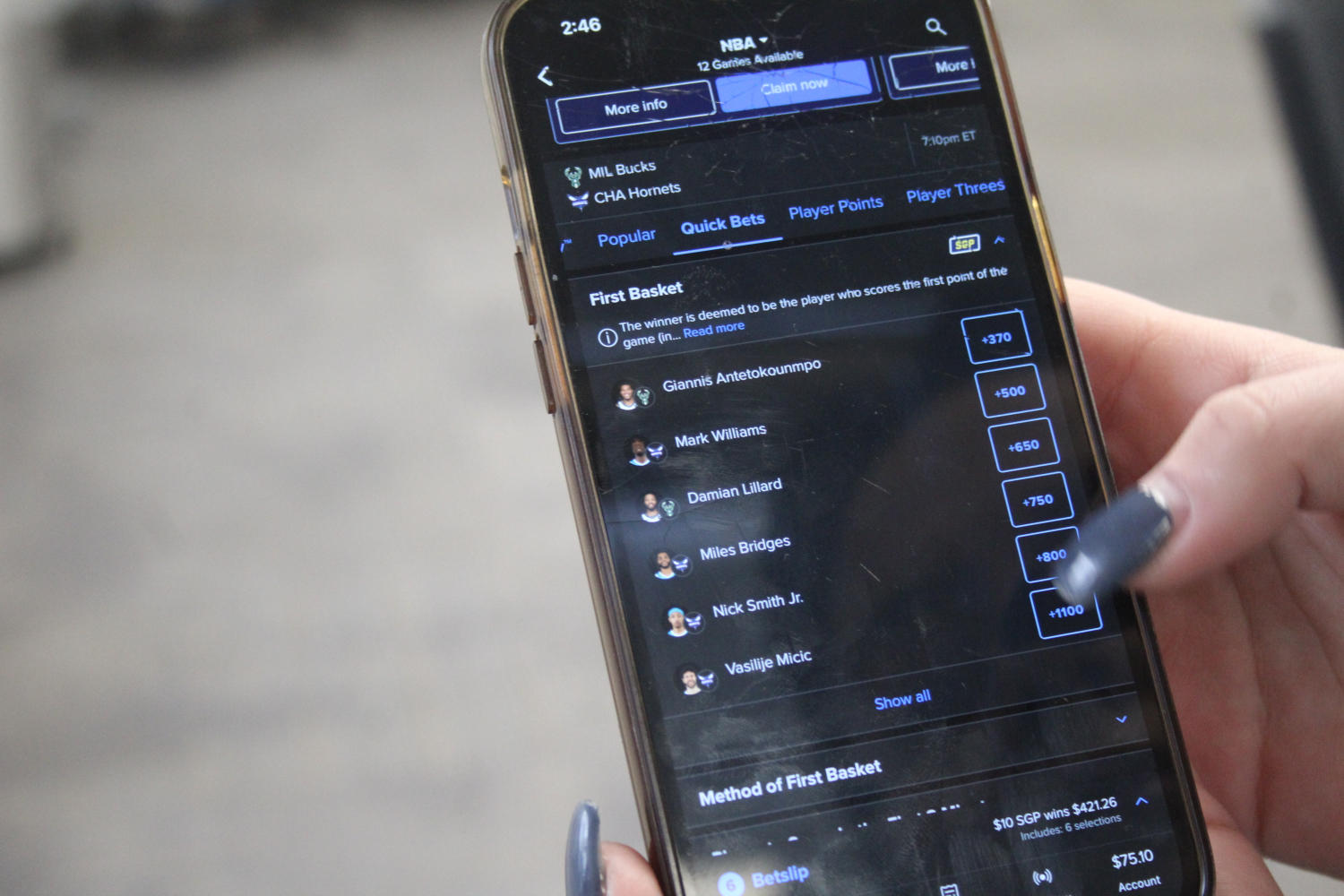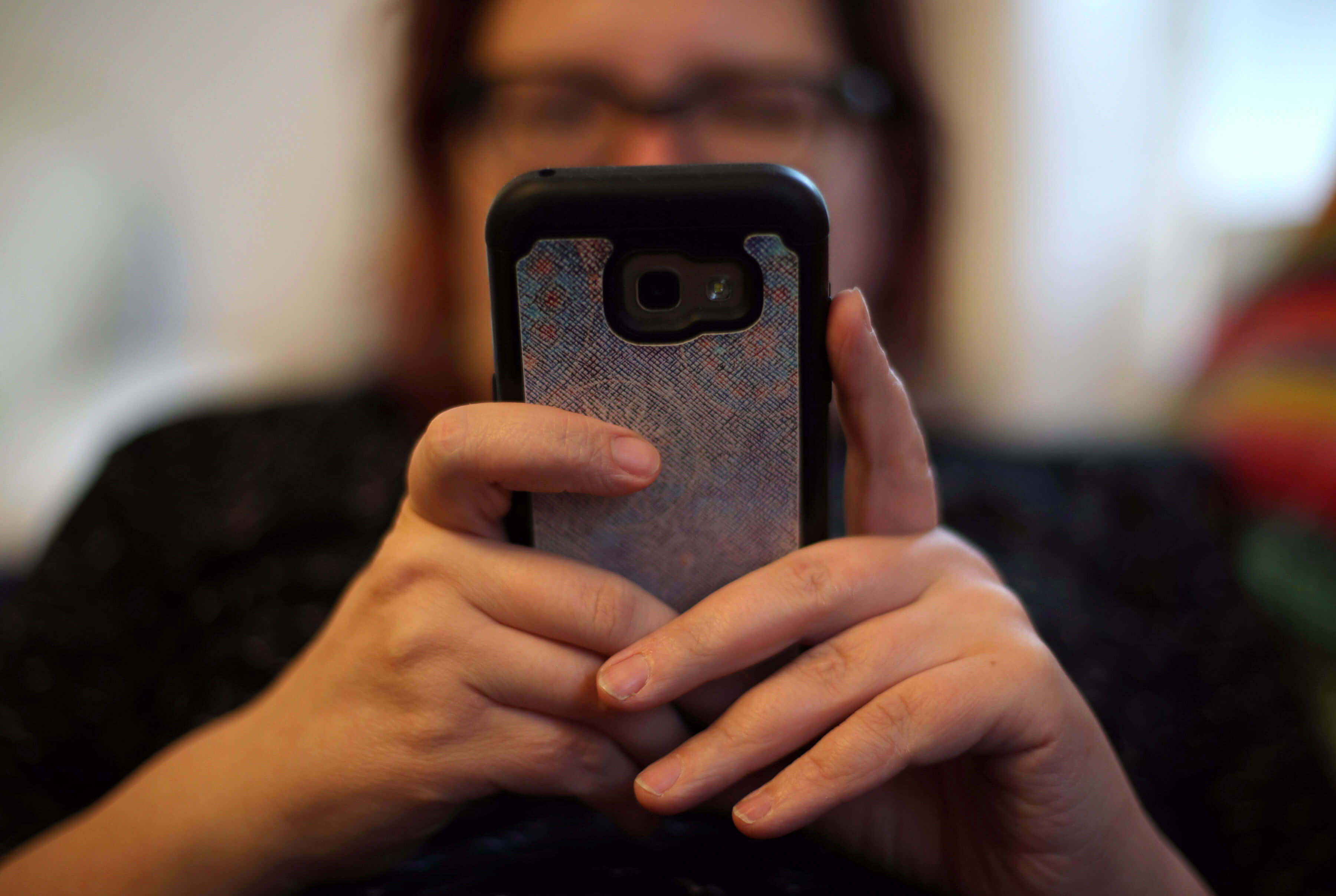Americans are betting more than ever on sports. Health experts worry about gambling disorders

$1.3 billion.
That’s how much Americans are expected to bet on a single event: The Super Bowl matchup on Feb. 9.
It highlights the growing number of people who engage in sports betting after the U.S. Supreme Court legalized it in 2018. And while it’s a fun hobby for many, there is a risk that some people may develop a problem.
Gambling addiction has long been linked to an increased risk of suicide. And early research –– not yet peer-reviewed –– points to an uptick in both debt and bankruptcy linked to a state’s legalization of sports betting.
Some health experts say awareness around the potential problems is lacking and worry not enough is being done to stop gambling disorders before it’s too late.
“We’re offering them aid and trying to rescue them with counseling, rather than putting up guard rails to prevent [gambling disorders] from happening,” said Mark Gottlieb, the executive director of the Public Health Advocacy Institute at Northwestern University School of Law. The institute sued the online sports betting company, DraftKings, two years ago accusing it of deceptive marketing practices. The lawsuit is still being litigated.
Gottlieb and others worry that the flood of TV advertisements and the modern ease of placing bets on a cell phone application around the clock has changed how addictive sports betting can be –– and how easily people can develop a problem.
“In fact, the artificial intelligence-generated micro bets and parlays that allow someone to place literally thousands of potential bets on a single contest is really a big part of the problem,” Gottlieb said.
Since the Supreme Court functionally allowed states to decide whether to legalize sports betting, roughly 38 states and Washington D.C. have moved to legalize some form of sports betting, with Missouri expected to follow suit shortly. Of those states, 30 allow online betting while others require retail or “in-person” bets to be placed at a brick-and-mortar location like a casino.
Sports betting industry insiders told Side Effects Public Media that they comply with state and federal laws.
Online apps also have a number of player supports aimed at keeping people from developing a problem. Those include pop-ups that alert users how much money they’ve bet or how much time they’ve been on the app, those pop-ups may also list the phone number of a gambling helpline.
And for gamblers who worry their habit is getting out of control, apps may also offer “self-exclusion” periods where users can’t log in to an account for months or even years.
Because of these protections, insiders said that legalized sports betting is safer than unregulated markets, and pointed to statistics from the National Council on Problem Gambling that show just 1% –– or about 2.5 million gamblers –– engage in problem gambling. Another 2 to 3% have mild or moderate gambling problems.
But Marc Potenza, a professor of psychiatry at Yale School of Medicine, said those numbers don’t capture the entire problem because only a fraction of people with gambling disorders will ever seek help.
“Oftentimes, it may go undetected and it may impact functioning in multiple domains –– work, finances, relationships,” he said. “Often it takes for things to get particularly bad for people to seek help.”
Since sports betting legalization, several states have seen an uptick in calls to problem gambling lines including Florida, Ohio, and Pennsylvania.
Potenza believes that the ability to bet – not just on the result of the game – but on lots of little events, like which player will make the first basket –– poses a particularly dangerous problem.
“Where do we draw the line, or the balance between permitting individual liberties versus promoting public health, particularly with respect to protecting vulnerable populations,” he said.
Of particular concern to experts is that more young people are engaging in sports betting, sometimes regardless of legal restrictions. According to the American Psychological Association, up to 5% of adolescents and young adults who gamble develop a disorder.
“A lot of [young] people don’t think about it as being gambling,” said Mary Lay, who manages the Indiana Problem Gambling Awareness Program at Indiana University in Bloomington. “It’s just kind of a fun thing you do on your phone, like playing a game.”
And it’s this gamification that worries many public health experts.
Lay said video game addiction may be connected to problematic gambling behavior. She pointed out that things like loot boxes –– mystery purchases in video games with randomized rewards like new character skins or power-ups –– often have an element of gambling to them.
But Lay said since Indiana legalized sports betting in 2019, the state hasn’t seen a major uptick in calls just yet.
“We’ve only been doing this for five years now. So, I think we’ll start to see how that is impacting hotline usage for people,” she said.
Sports betting may have downstream consequences
Research on the negative impacts of legalized sports betting is still in the early stages, but some findings are already raising alarms.
One working paper, which has yet to be peer-reviewed, found a link between sports betting and an increase in intimate partner violence.
The paper looked at states before and after legalizing sports betting. What they found is that in areas where a local professional sports team had an unexpected loss, there can be a 10% increase in intimate partner violence compared with pre-legalization.
The increase comes as no surprise to Caryn Burton, the Homicide Reduction Strategies Coordinator for the Indiana Coalition Against Domestic Violence.
She said it’s anecdotal but the coalition, which manages a domestic violence hotline, has come to expect an uptick in calls around big sporting events like the Super Bowl –– even before the legalization of sports betting.
“It’s standard operating procedure for our shelters and for our advocacy programs to kind of know that there’s an increase coming,” she said. “Our advocates know they’re just going to get maybe a couple more calls, maybe some calls that are a little bit more intense. So, anecdotally, we know that it happens.”
Another paper, currently under review, found that the rate of “irresponsible gambling” –– those who bet more than 1% of their income on gambling –– post-legalization rose from 0.2% to 1%.
How do states tax sports betting?
Some experts say it’s important to understand the sheer amount of money being spent on sports betting.
In 2024, Americans bet an estimated $150 billion on sports, according to the American Gaming Association. That’s enough to fund the treatment of more than 800,000 cancer patients in the U.S. or build more than 200,000 new single-family homes. It’s a massive sum that some state economies have found ways to benefit from, while others are still lagging.
In Indiana, the state received roughly $43 million in taxes on sports betting. But Indiana’s sports betting tax rates are low compared to many other states.
John Holden, an associate professor in the business law and ethics department at the Kelly School of Business at Indiana University Bloomington, said the state taxes betting revenues at a low rate of 9.5%. The state of New York taxes it at 51%, tied with New Hampshire and Rhode Island for the nation’s highest.
Other states, like Ohio, have recently moved to increase the tax rate on sports betting from 10% to 20%.
“One of the arguments out there is that this lower tax rate creates a more competitive market, so, you’ll have more people gambling in this regulated market, instead of seeking out these unregulated alternatives that have existed for years,” he said. “But you know, in terms of looking at sort of the raw numbers in terms of tax dollars, Indiana is certainly not bringing in huge amounts.”
When Indiana legalized sports betting it set 3% of the tax revenue aside for gambling addiction services. Like Indiana, both Ohio and Kentucky place roughly 2% of tax revenues into a gambling addiction fund. Illinois and Iowa put tax revenue from betting into a fund but do not appear to earmark any of that for addiction services.
Holden said many states don’t allocate enough resources for problem gambling from the taxes on sports betting.
“You need to have these safeguards in place to help people when [gamblers] do experience harm, and that’s been probably one of the biggest failures of the rollout across the country,” he said.
All of these worries about the impacts of sports betting have led to an increased level of scrutiny at the federal level, with lawmakers even considering regulations, including proposals to limit gambling ads during sports broadcasts and require affordability checks on gamblers making large numbers of bets.
If you or your loved one is struggling with problem gambling you can reach the National Problem Gambling Hotline at 1-800-GAMBLER.
Contact Side Effects Public Media’s Health Reporter Benjamin Thorp at bthorp@wfyi.org.
Side Effects Public Media is a health reporting collaboration based at WFYI in Indianapolis. We partner with NPR stations across the Midwest and surrounding areas — including KBIA and KCUR in Missouri, Iowa Public Radio, Ideastream in Ohio and WFPL in Kentucky.
Related
Sports Betting Giant Flutter Forecasts Strong U.S. Growth To Drive…
Flutter CEO Peter Jackson.Courtesy of Flutter Entertainment Flutter Entertainment, the world’s largest online gambling company, said that it’s expecting str
BetBlocker Enters US Responsible Gambling Market
The charity, originally from the UK, launched a US unit, BetBlocker US, as part of its North American entry. The organiz
Viewers react to ’embarrassing’ JD Vance comment toward Zelenskyy as…
Social media users watching clips of the heated meeting between President Donald Trump, Vice President JD Vance and President Volodymyr Zelenskyy have called a
Ukraine latest: Zelensky urges Trump to stand ‘more firmly on…
We have Zelensky's statement in full Below, we have Ukrainian president Volodymyr Zelensky’s statement in full after touching down in the UK following a fiery













